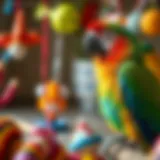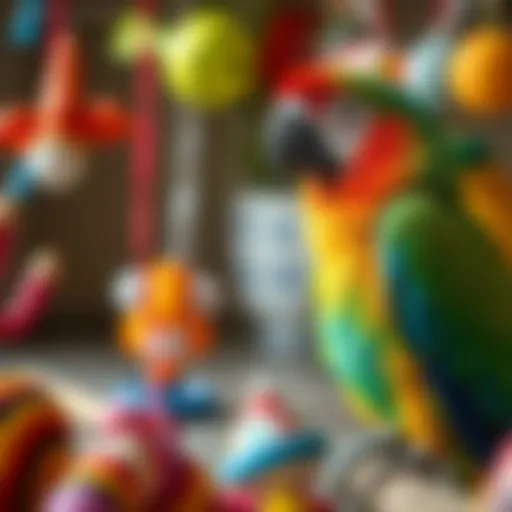Finding an Avian Specialist: A Comprehensive Guide
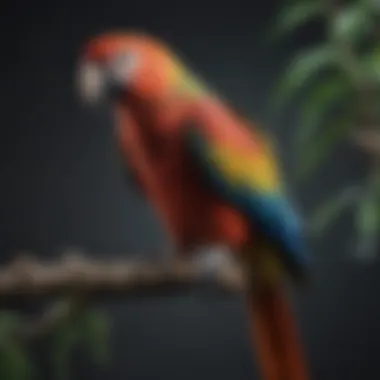

Intro
Finding a qualified avian specialist is crucial for ensuring the health and well-being of your pet bird. Many pet owners may not realize the unique needs of their avian companions. Unlike other pets, birds require specialized care tailored to their specific species and behaviors. This article is designed to provide a thorough examination of the various aspects of avian care and assist in locating competent avian specialists near you.
Understanding the distinctive needs of different bird species can significantly impact their overall health. It's vital to recognize that not all veterinarians possess the necessary expertise in avian medicine. This guide will walk you through the essential criteria when selecting an avian specialist, address key health issues that may arise, and highlight the importance of regular veterinary visits. By the end, you will have the tools and knowledge to better care for your feathered friend.
Understanding Your Pet
To provide the best care for your avian companion, it is essential to understand their needs and behavior. Birds, while often seen as simple pets, are immensely complex creatures that thrive on mental stimulation and well-structured environments.
Pet Behavior Basics
Birds exhibit a variety of behaviors, and understanding these can help you better connect with them. Common behaviors in pet birds might include chirping, preening, and social interactions. Recognizing normal behavior patterns can assist in identifying when something is amiss.
Common Breed Characteristics
Different bird species have unique characteristics that may affect how they interact with their environment and you as a pet owner. For instance, parrots are known for their vocalizations and emotional intelligence, while canaries are renowned for their beautiful songs. Understanding these traits aids in creating a nurturing environment.
Species-Specific Needs
Each species of bird has distinct requirements, including their diet, habitat, and enrichment activities. For example, large parrots need ample space and toys to chew on, while small finches may require less space but more opportunities for socialization with their flock. Ensuring you meet these specific needs is vital for their well-being.
Pet Care and Maintenance
Maintaining your pet bird’s health involves proper care and maintenance. A solid understanding of how to care for your bird can prevent health issues and ensure a long, happy life.
Feeding Guidelines
A balanced diet is key to a bird's health. Many birds thrive on a varied diet that includes seeds, pellets, fresh fruits, and vegetables. Researching the dietary needs specific to your bird species can prevent nutritional deficiencies.
Grooming Essentials
Regular grooming is necessary for keeping your bird healthy. This includes nail trimming, feather care, and beak maintenance. Some birds may also need baths to help keep their feathers clean and healthy.
Hygiene Practices
Birds are susceptible to diseases, so maintaining a clean environment is imperative. Regularly cleaning their cage and toys can help prevent infections and other health issues.
Health and Wellness
Regular check-ups with an avian specialist are essential for ensuring your bird remains healthy throughout its life. Awareness of health-related issues specific to birds can lead to early detection and treatment.
Routine Vet Check-ups
Avian specialists recommend routine veterinary check-ups to monitor your bird's health. Regular check-ups can help catch potential problems before they become serious issues.
Vaccination Needs
Some bird species require vaccinations to protect against diseases. Consulting with an avian specialist will help determine the vaccination needs of your pet.
Recognizing Signs of Illness
Being aware of the signs of illness is crucial. Common indicators include changes in appetite, behavior, or droppings. Prompt attention to these signs can be lifesaving.
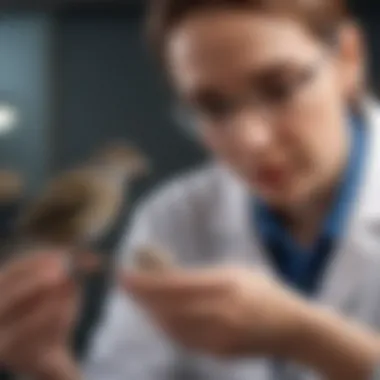

Enrichment and Activities
Engaging your bird in enrichment activities is vital for their mental health. Boredom can lead to destructive behavior, so providing opportunities for stimulation is essential.
Indoor vs.
Outdoor Activities
Both indoor and outdoor activities provide necessary enrichment. Indoor activities should focus on interactive play, while outdoor activities can include safe, supervised time in a secure area.
Interactive Toys and Games
Investing in interactive toys is beneficial. Toys that encourage problem-solving and physical activity can keep your bird engaged and healthy.
Socialization Opportunities
Birds are social creatures. Providing them with proper socialization opportunities, whether through human interaction or with other birds, is key to their well-being.
In summary, understanding the nuances of avian care and connecting with a qualified avian specialist are critical steps for any pet bird owner. Careful attention to the needs and behaviors of your feathered companion will lead to a happier and healthier life for both you and your pet.
Prelims to Avian Specialists
Avian specialists play a critical role in the health and well-being of birds. These professionals possess a unique set of skills and knowledge that sets them apart from general veterinarians. Understanding their expertise is crucial for bird owners looking to provide appropriate care for their feathered companions. This section will define who avian specialists are and outline the importance of avian health care.
Definition of an Avian Specialist
An avian specialist is a veterinarian who has received additional training and education specifically focused on the medical and surgical care of birds. Unlike general veterinarians who may treat various pets, avian specialists have in-depth understanding of avian anatomy, physiology, behavior, and common diseases. They are equipped to diagnose and treat a wide range of conditions unique to birds, from respiratory issues to behavioral challenges. It is important for pet owners to seek out these specialists to ensure their birds receive expert care.
Importance of Avian Health Care
Avian health care is vital for maintaining the overall well-being of pet birds. Birds, often regarded as delicate creatures, can be susceptible to various health issues that require timely intervention. Regular checkups with an avian specialist can help in the early detection of potential problems. Preventative care is key in keeping your avian companion healthy and happy.
Quote: *
Why Consult an Avian Specialist
Avian care requires specialized knowledge that often goes beyond what general veterinarians can provide. Consulting an avian specialist is paramount for ensuring the optimal health of pet birds. These experts are trained specifically to diagnose and treat a range of issues unique to avian species. By seeking help from a professional with a focused background in avian medicine, pet owners increase the chances of receiving comprehensive care tailored to their feathered companions.
Differences Between General Veterinarians and Avian Specialists
General veterinarians are adept at handling a variety of animals. However, they might lack in-depth training on the unique physiological and behavioral traits of birds. Avian specialists have extensive experience in treating bird-related conditions. They are well-versed in the specific dietary needs, common illnesses, and behavior of different bird species. This specialization results in a more accurate diagnosis and an appropriate treatment plan.
In addition, avian specialists utilize specialized equipment for diagnostics and treatments. Such tools may include unique imaging devices suggested for avian anatomy, which are not typically available in general veterinary clinics. Therefore, for effective preventive care and treatment, avian specialists are the clear choice for pet owners.
Common Avian Health Issues Addressed
Respiratory Infections
Respiratory infections are a significant concern among birds. One key characteristic is that they can escalate quickly if not addressed. Birds are very sensitive to environmental changes, and exposure to irritants can quickly lead to respiratory distress. Common signs include coughing, sneezing, and labored breathing.
Consulting an avian specialist for respiratory issues is crucial. They have the skills to determine the cause—whether it's an infectious agent, environmental factors, or something else entirely. A timely diagnosis allows for appropriate treatment, which can greatly improve a bird's outcome and quality of life.
Feather Disorders
Feather disorders can also pose serious health risks for birds. These conditions can result in feather loss, abnormal feather formation, and sometimes underlying medical issues. A common feature of feather disorders is that they can be linked to nutritional deficiencies, environmental stressors, or even psychological factors.
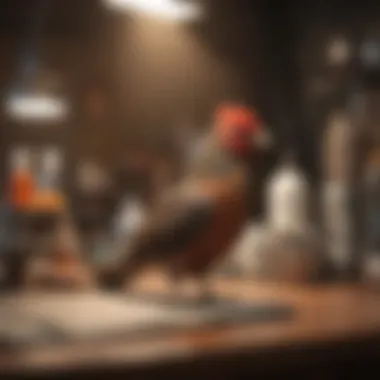

Addressing these concerns through an avian specialist is beneficial for a couple of reasons. First, they can conduct thorough diagnostic tests to pinpoint the problem. Second, they can offer tailored recommendations, such as dietary adjustments or changes in habitat, to help promote proper feather health.
Behavioral Problems
Behavioral problems in birds can often be misunderstood by non-specialists. These issues can stem from a variety of sources, ranging from boredom to underlying medical conditions. Common signs include excessive screaming, plucking, or aggression.
Avian specialists are trained to identify the root cause of these behaviors. They can provide insights on improving environmental enrichment and social interaction. By addressing behavioral problems early, pet owners can prevent further complications that may arise from unaddressed stress or anxiety in their birds.
How to Locate an Avian Specialist Near You
Finding a qualified avian specialist is a crucial step for any pet owner who cares for birds. These professionals are trained specifically to address the unique health needs of avian species. Their expertise is essential in ensuring your pet bird receives the appropriate care necessary for a long, healthy life. This section will guide pet owners through various ways to find avian specialists in their area, emphasizing online resources and local referrals.
Online Resources and Directories
The internet can be a powerful tool in identifying avian specialists near you. Many reputable websites offer directories that list qualified vets based on your location. Here are some recommended resources to utilize:
- Association of Avian Veterinarians (AAV): This organization has an online directory of avian vets that can be filtered by location. It ensures that you find professionals with the necessary expertise.
- Vetstreet: This platform allows users to search by zip code and provides profiles of local veterinarians, including their specialties.
- Google Maps: A simple search like
Qualifications and Credentials of Avian Specialists
The qualifications and credentials of avian specialists are of immense importance in ensuring the health and wellbeing of pet birds. Owners should understand that not all veterinarians possess the expertise required to treat avian species effectively. Specialists in avian care focus solely on birds and have more extensive training in avian medicine compared to general veterinarians. This knowledge is crucial when dealing with the unique physiology, behaviors, and health issues that birds can exhibit. Knowing what qualifies a specialist can make a significant difference in the care your pet receives.
Educational Background
Avian specialists typically start with a solid foundation in veterinary medicine. They complete a Doctor of Veterinary Medicine (DVM) degree from an accredited institution. During veterinary school, students take a range of courses, but the exposure to avian medicine can be limited. Therefore, many aspiring avian specialists pursue additional training to specialize further.
After obtaining their DVM, these veterinarians often participate in internships or residencies where they can focus specifically on avian health. This hands-on experience enables them to diagnose and treat a variety of bird species and their unique health concerns.
Additionally, their education often continues beyond formal schooling. Avian specialists may attend workshops, conferences, and seminars focused on new advancements in avian care. This commitment to education ensures that specialists stay current with the latest research and practices in the field.
Certifications and Fellowships
Earning certifications and fellowships is another step that sets avian specialists apart from general veterinarians. Many practitioners pursue certification from recognized bodies, such as the American Board of Veterinary Practitioners (ABVP) in the specialty of avian medicine. To obtain such certification, veterinarians must pass rigorous examinations that test their knowledge and skills in avian health care.
Fellowships, like those offered by the Association of Avian Veterinarians, also add prestige and credibility to a specialist's qualifications. These fellowships often require practitioners to exhibit a continued commitment to avian medicine through clinical practice, research, and teaching.
When looking for an avian specialist, it is advisable to inquire about their certifications and any affiliations with professional organizations. These credentials reflect their dedication and expertise in avian health care.
What to Expect During an Avian Consultation
Understanding what happens during an avian consultation is vital for pet owners. This is an opportunity to address your bird's health and well-being. Preparing for this experience ensures that you maximize the benefits and help your companion receive the best possible care.
During the consult, avian specialists conduct a thorough assessment of your pet bird, evaluate its needs, and determine any health concerns present. It is also a time for you to ask questions. Knowing what to expect helps alleviate any anxiety, promoting a cooperative experience.
Initial Health Assessments
The initial health assessment forms the backbone of the avian consultation. It generally begins with a complete physical examination. The specialist checks the bird’s feathers, skin, beak, and feet for signs of illness. They may also assess the bird's behavior and mood as these factors can speak volumes about its overall health.
Additionally, the vet will ask about your bird’s diet, living conditions, and any behavioral changes you may have noticed. Documenting your observations beforehand can help provide a clearer picture and streamline the assessment process. This initial assessment ensures that no potential issue goes unnoticed, laying the groundwork for further diagnostics.
Diagnostic Procedures
Diagnostic procedures are critical for understanding your bird's health concerns. These tests allow specialists to gain insight and develop effective treatment protocols.


Blood Tests
Blood tests are essential for diagnosing many conditions in birds. They can reveal underlying infections, organ function, and nutritional deficiencies. A key characteristic of blood tests is that they are minimally invasive. This means they generally cause less stress to your pet compared to more invasive diagnostic methods.
Blood tests can often be done in-house, with results available quickly. This benefits pets and owners alike by facilitating prompt decision-making. However, a disadvantage is that some conditions may require specialized testing. Adapting to these circumstances is crucial, as further actions might be dictated by initial results.
Imaging Techniques
Imaging techniques provide valuable information about internal structures that may not be assessable through physical examination. Radiographs, or X-rays, help specialists visualize skeletal and some soft tissue problems. It can help in diagnosing issues like fractures, tumors, or respiratory problems.
A key aspect of imaging techniques is their ability to provide detailed information without a surgical procedure. This feature often makes them a popular choice for avian diagnostics. However, limitations exist, as imaging cannot always detect subtle changes in certain health conditions. Understanding these procedures can inform pet owners about what to expect and how to interpret results.
Recommended Treatments and Follow-Ups
After the diagnostic assessments, the avian specialist will recommend suitable treatments. This may include medications, dietary changes, or other interventions tailored to your pet's needs. Follow-up appointments may be necessary to monitor progress or adjust treatment plans. Routine checkups help maintain your bird's health and well-being over time. Remember, ongoing communication with the specialist is crucial to achieving the best outcomes for your avian companion.
Maintaining Avian Health Beyond Consultations
Maintaining the health of pet birds is not solely reliant on consultations with avian specialists. While initial assessments and diagnostic procedures are crucial for immediate health issues, ongoing care and attention play an equally vital role in overall well-being. Understanding how to maintain avian health beyond formal consultations is essential for all bird owners. It leads to better longevity and enhances the quality of life of feathered companions.
Importance of Regular Checkups
Regular checkups are fundamental in avian health care. Unlike other pets, birds often hide symptoms of illness until they are severely affected. Regular visits to an avian specialist allow for early detection of any potential health issues. During these visits, professionals can assess the bird's weight, feather condition, and behavior.
- Routine examinations help in identifying changes in normal health parameters.
- Vaccinations may be recommended based on specific circumstances, bolstering the bird's immunity.
- Parasite control is another component that needs regular attention. Birds can harbor parasites without showing outward signs, leading to severe health problems.
In essence, regular checkups facilitate a proactive approach to avian health management and help prevent more serious health issues from developing.
Role of Preventive Care
Preventive care is key to maintaining bird health throughout their life. It encompasses various strategies, practices, and interventions designed to prevent health challenges before they arise. This approach includes:
- Nutrition Management: Providing a well-balanced diet is critical. Birds need a mix of seeds, pellets, fruits, and vegetables tailored to their species.
- Environmental Enrichment: A stimulating environment supports behavioral health. Providing toys, perches, and opportunities for social interaction keeps birds mentally exercised and prevents boredom-related issues.
- Hygiene Practices: Keeping the bird's living area clean reduces the likelihood of infections and other health complications.
Preventive care saves money in the long run by reducing the risk of expensive treatments for preventable diseases.
Pet owners should integrate preventive practices into their daily routines and work closely with their avian specialist to develop a comprehensive health plan. Investing time and resources in preventive care means a healthier and happier bird.
Resources for Avian Care
Understanding avian care requires access to accurate and comprehensive resources. This section will elaborate on the various materials and organizations available to pet owners seeking knowledge about their birds’ health and well-being. By utilizing these resources, caregivers can ensure they make informed decisions regarding their feathered companions.
Books and Online Literature
Books and online literature are invaluable for pet owners looking to deepen their understanding of avian care. Many authors have dedicated their work to specific bird species, health issues, and behavioral concerns. For instance, The Complete Guide to Bird Care is a useful title that covers fundamental aspects of pet bird care from nutrition to habitat.
In addition to books, online articles and e-books are abundant and can offer timely information. Websites like Wikipedia and Britannica provide articles about avian species, health care, and veterinary methods that are well-researched and reliable. Engaging with these resources helps pet owners navigate health concerns or behavioral issues effectively.
You can find specialized literature through resources like Amazon, local libraries, or avian-focused bookstores. These sources not only inform pet owners about health maintenance but also educate them on the preferences and habits of different species. Additionally, magazines such as Birds USA offer articles from experts that present current trends and research in the avian field.
Avian Welfare Organizations
Avian welfare organizations play a crucial role in supporting both pet owners and the larger avian community. These organizations are dedicated to the health and welfare of birds, indicating just how serious avian care is regarded. They often provide a wealth of resources, ranging from educational materials to health services. Organizations like the American Bird Conservancy and The World Parrot Trust work tirelessly to protect bird species and provide essential care guidelines for pet birds.
These entities also create awareness about responsible pet ownership, advocating for informed decision-making in bird care. They often host workshops, seminars, and webinars to educate pet owners about various aspects of avian health and behavior.
Further, many avian welfare organizations promote adoption and rescue initiatives, emphasizing the importance of adopting rather than shopping for pet birds. In doing so, they help facilitate a better understanding of how to care for birds from various backgrounds.
Engaging with these organizations can often connect bird owners to local resources, creating a network of support within the avian community. Ultimately, leveraging these books and organizations will greatly enhance a pet owner's competence and confidence in caring for their avian companions.
Access to reliable resources is essential for maintaining the health and wellbeing of pet birds.


